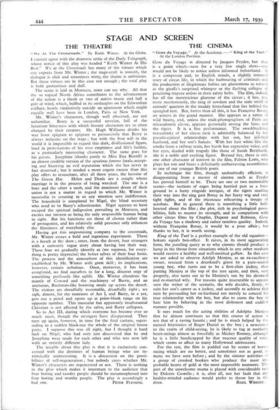STAGE AND SCREEN
THE THEATRE
e At The Crossroads." By Keith White'. At the Globe.
I CANNOT agree with the dramatic critic of the Daily Telegraph, whose notice of this play was headed " Keith Winter At His Best." We at the Crossroads has many of the virtues which one expects from Mr. Winter ; the stage-craft is smooth, the dialogue is slick and sometimes witty, the theme is ambitious. But these virtues are in this case not enough ; the total play is both pretentious and dull.
The scene is laid in Morocco, none can say why. All that the so topical North Africa contributes to the advancement of the action is a throb or two of native music and half a gale of wind, which, baffled in its onslaughts on the Edwardian coiffure, howls vindictively outside an apartment which might equally well have been in London, Paris or New York.
Mr. Winter's characters, though well observed, are not unfamiliar. Barry is a successful novelist, full of the luxuriant bitterness with which literary characters are so often charged by their creators. Mr. Hugh Williams drinks his way from epigram to epigram so persuasively that Barry is always welcome on the stage ; but with the best will in the world it is impossible to regard this dark, disillusioned figure, loud in protestations of his own emptiness and life's futility, as a particularly interesting character. The same goes for his guests. Josephine (thanks partly to Miss Ena Burrill) is an almost credible version of the spurious femme fatale, accept- ing and flaunting an evil reputation which she has never in fact deserved ; but it needed a more cogent excuse than this play offers to resuscitate, after all these years, the heroine of
The Green Hat. Helen and Denis are a couple whose marriage is in the process of being wrecked. The one is a bore and the other a snob, and the imminent doom of their union is not a matter in regard to which Mr. Winter is successful in arousing in us any emotion save indifference. The household is completed by Nigel, the blind secretary who used to be Barry's schoolmaster. Nigel appears to have escaped the spiritual indigestion prevailing in Morocco, and excites our interest as being the only responsible human being in sight. But his functions are those of chorus rather than of protagonist, and his relatively solid presence only enhances the flimsiness of everybody else.
Having got this unpromising company to the crossroads, Mr. Winter essays a bold and ingenious experiment. There is a knock at the door ; enter, from the desert, four strangers with a curiously vague story about having lost their way. These four we gradually identify as (we suppose, for every- thing is pretty imprecise) the better selves of their four hosts. The process and the atmosphere of this identification are established by Mr. Winter with great skill ; its implications, however, remain nebulous. Once, moreover, it has been completed, we find ourselves in for a long, discreet orgy of something perilously like uplift. Mr. Winter abandons the mantle of Coward and the machinery of Barrie, and an unctuous, Buchman-like booming steals up across the desert. The visitors are dreadfully reasonable, dreadfully right ; we sigh, almost, for the tantrums of Act I, and Barry, in a pet, gets out a pistol and opens up at point-blank range on his opposite number. This muscular but apparently insubstantial Christian is not affected by the salvo, and Barry collapses.
So to Act III, during which everyone has become ever so much nicer, though the strangers have disappeared. They turn up again, however, in time for the final curtain, super- seding in a sudden black-out the whole of the original house party. I suppose this was all right, but I thought it hard luck on Nigel, who had only just discovered that he and Josephine were made for each other and who was now left with an entirely different lady.
The trouble about this play is that it is exclusively con- cerned with the destinies of human beings who are in- trinsically uninteresting. It is a discussion on the possi- bilities of self-regeneration ; but nobody cares whether Mr. Winter's characters are regenerated or not. There is nothing in the play which makes it important to the audience that four boring and tawdry people should be metamorphosed into four boring and worthy people. The play is accordingly a










































 Previous page
Previous page